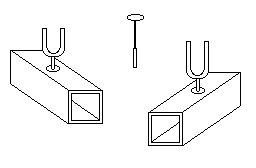Difference between revisions of "Tuning Forks--Matched Pair"
From UO Physics Demonstration Catalog
(Created page with "{{NewDemo|subject=OWS|topic=Sound|file1=Tuning Forks Matched Pair.gif}} Both forks sound at the same pitch. When the open ends of the boxes are set together, one fork can be started and it will drive the other. '''Location: ''' * Shelf D-4") |
|||
| Line 1: | Line 1: | ||
{{NewDemo|subject=OWS|topic=Sound|file1=Tuning Forks Matched Pair.gif}} | {{NewDemo|subject=OWS|topic=Sound|file1=Tuning Forks Matched Pair.gif}} | ||
Both forks sound at the same pitch. When the open ends of the boxes are set together, one fork can be started and | Sympathetic Resonance. Both forks sound at the same pitch. When the open ends of the boxes are set close together pointing towards each other, , one fork can be started and the second fork will be excited. Strike one fork with the rubber hammer. The place your hand on the fork you hit, and then you will hear the second fork vibrating. In large lecture room you can put a microphone in front of the second tuning fork. | ||
The tuning forks have a sliding bar that can vary the pitch. You can set the forks to have slightly different frequencies and repeat the experiment and then the second form will not respond. | |||
You can also use the two different frequencies to observe Beat Frequencies, | |||
'''Location: | '''Location: | ||
''' | ''' | ||
* Shelf D-4 | * Shelf D-4 | ||
Latest revision as of 12:10, 9 January 2023
Return to Sound
Description:
Sympathetic Resonance. Both forks sound at the same pitch. When the open ends of the boxes are set close together pointing towards each other, , one fork can be started and the second fork will be excited. Strike one fork with the rubber hammer. The place your hand on the fork you hit, and then you will hear the second fork vibrating. In large lecture room you can put a microphone in front of the second tuning fork.
The tuning forks have a sliding bar that can vary the pitch. You can set the forks to have slightly different frequencies and repeat the experiment and then the second form will not respond.
You can also use the two different frequencies to observe Beat Frequencies,
Location:
- Shelf D-4
